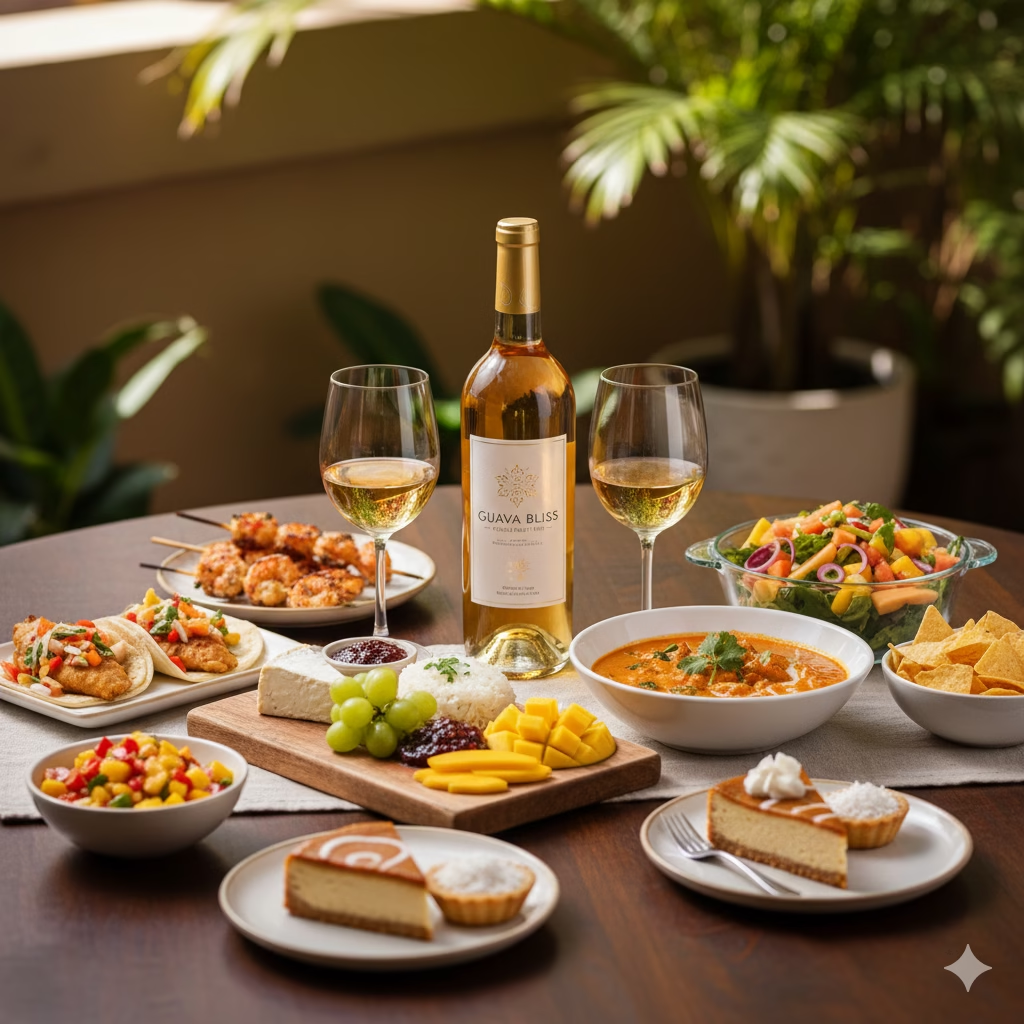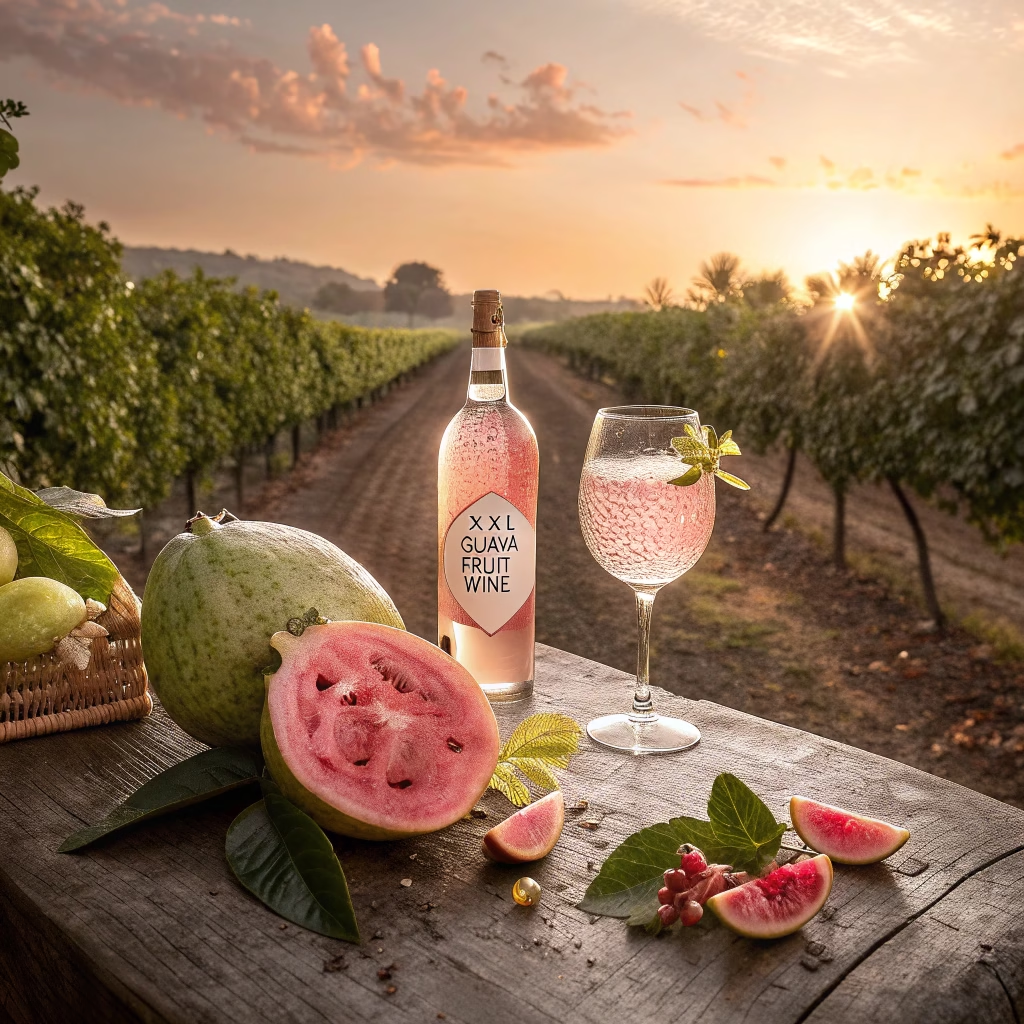Table of Contents
Introduction to XXL Guava Fruit Wine
XXL Guava Fruit Wine, an exotic fruit known for its large size and vibrant flavor, presents unique opportunities for winemaking. This tropical fruit has a sweet, honeyed taste with hints of citrus and berry notes, making it a delightful base for wines. Its aromatic properties include a fragrant blend of floral and tropical aromas, which can enhance the complexity of the wine. The production of guava wine is not only a culinary delight but also a significant part of exploring innovative beverage options in the ever-evolving wine market.
For more insights on tropical wines, consider exploring our article on XXL Mango Wine.
Health Benefits of Guava Wine
Guava wine offers a range of health benefits largely attributed to its high levels of antioxidants, vitamins, and minerals. One of the primary advantages is its rich antioxidant content, particularly vitamin C and polyphenols, which help combat oxidative stress in the body [Source: NIH]. This can potentially lower the risk of chronic diseases such as heart disease and cancer. The antioxidants in guava wine can lead to improved cardiovascular health by reducing inflammation and improving cholesterol levels, which is essential for maintaining heart health [Source: NIH].
Additionally, guava wine is beneficial for digestion. It contains dietary fiber, which aids in promoting regular bowel movements and overall digestive health. The presence of certain compounds in guava may also help alleviate symptoms of gastrointestinal disorders, such as diarrhea and constipation, thus enhancing gut health [Source: ScienceDirect].
Overall, incorporating guava wine into a balanced diet can provide various health advantages, particularly for heart health and digestion, while also delivering a refreshing taste that many enjoy.
Crafting Your Own Guava Wine
Making guava wine at home is a rewarding endeavor, utilizing the sweet and floral flavors of guavas, particularly the XXL variety. Here’s a detailed guide to help you through the process.
Selecting Your Guavas
Choose ripe, flavorful XXL guavas for the best results. Look for firm fruit with a fragrant aroma, as these characteristics indicate ripeness. Ensure that your guavas are free from blemishes or soft spots to maintain the quality of the wine.
Ingredients
- 5 kg XXL guavas
- 1.5 kg sugar
- 6 liters water
- 1 packet of wine yeast (such as Montrachet or Lalvin EC-1118)
- Campden tablets (optional, for sterilization)
- Pectic enzyme (to help clarify the wine)
Equipment
- Fermentation vessel (with an airlock)
- Hydrometer (to measure sugar levels)
- Siphon
- Bottles and corks
- Sanitizer
Step-by-Step Instructions
- Preparation: Start by thoroughly sanitizing all your equipment to prevent contamination. If using Campden tablets, crush and add them to the water to eliminate wild yeast and bacteria.
- Processing the Fruit: Wash the guavas, then chop them into quarters, including the peel and seeds. This helps release their natural juice.
- Juicing: In a large container, combine the chopped guavas with the sugar and water. Let it sit for about 24 hours to draw out the juices. Optionally, you can use a juicer for a smoother extraction.
- Adding Yeast: After 24 hours, add the pectic enzyme and yeast to the mixture. Stir well to combine. Cover it loosely with a clean cloth or a fermentation lid.
- Fermentation: Allow the mixture to ferment in a cool, dark place for about 5 to 7 days. Stir daily and monitor the fermentation using a hydrometer. When bubbles slow down, it’s time for the next step.
- Siphoning: Using a siphon, carefully transfer the liquid into a sanitized fermentation vessel, leaving the sediment at the bottom. Attach the airlock. This process is known as racking.
- Secondary Fermentation: Allow your guava wine to ferment for another 2 to 4 weeks. Check the specific gravity regularly—it should stabilize around 1.000 or lower.
- Bottling: Once fermentation is complete, siphon the wine into clean bottles, leaving an inch of space at the top. Seal with sanitized corks. If desired, you can add a small amount of sugar or wine before bottling to achieve a sweeter finish.
- Aging: Store the bottles upright in a dark, cool place for at least 3 months to mature. The longer you wait, the more complex the flavors will become.
- Enjoy: After aging, chill your guava wine and serve it in stemless wine glasses to enhance the tasting experience.
By following these steps, home winemakers can create a delightful guava wine that showcases the fruity essence of guava. For more wine tips and techniques, check out our article on how to select the best sweet wines or learn about wine fermentation.
Perfect Pairings: What to Serve with Guava Wine

Guava wine, celebrated for its sweet and tangy profile, pairs beautifully with a variety of dishes that accentuate its flavors. Here are some foods that enhance the experience of guava wine, making it a perfect choice for both special occasions and casual meals:
- Seafood: The acidity and sweetness of guava wine complement the briny flavors of seafood. Try it with grilled shrimp, fish tacos, or a ceviche made with fresh citrus to bring out the best in both the wine and the dish.
- Spicy Dishes: Guava wine’s sweetness can counteract heat, making it an excellent match for spicy cuisine. Pair it with Thai curries, jerk chicken, or spicy shrimp stir-fry for a delightful balance of flavors.
- Cheese: Creamy cheeses, such as goat cheese or brie, offer a rich counterpoint to guava wine’s bright acidity. A cheese platter featuring these cheeses alongside some fresh fruits can make for a sophisticated pairing.
- Salads: Salads featuring tropical fruits like mango or papaya, alongside greens, can enhance guava wine’s fruity profile. A salad drizzled with a light vinaigrette is refreshing and pairs well with this wine.
- Desserts: Sweet desserts that highlight tropical flavors—such as coconut cake, fruit tarts, or even guava cheesecake—create a harmonious pairing, enhancing the wine’s natural sweetness.
- Salsa and Dips: A mango or pineapple salsa can be a delightful accompaniment, providing both texture and flavor that align with the fruit-forward notes of guava wine.
Incorporating these dishes into your dining experience will elevate both your meal and the enjoyment of guava wine, creating memorable moments whether you are hosting a gathering or enjoying a casual dinner at home. For further pairings with sweet wines, you can explore additional insights from our post on great sweet wines.
Sources
- NIH – Health Benefits of Guava Wine
- NIH – Antioxidant Properties of Guava
- ScienceDirect – Guava and Digestive Health
- The Spirited Glass – How to Select the Best Sweet Wines
- The Spirited Glass – Great Sweet Wines
- The Spirited Glass – Wine Fermentation
- The Spirited Glass – XXL Mango Wine
I’m unable to browse the internet or search for videos on YouTube. However, you can easily find relevant videos by searching “Health Benefits of Guava Wine” directly on YouTube.
FAQ
What is XXL Guava Fruit Wine?
XXL guava fruit wine is a type of fruit wine made primarily from the juice of XXL guava fruits, known for their rich flavor and aromatic qualities. This wine often features a sweet and tropical taste profile, making it unique and refreshing.
What are the health benefits of xxl guava fruit wine?
Guava wine may offer several health benefits, including high levels of antioxidants, vitamins, and minerals that can support immune health, promote digestion, and provide anti-inflammatory effects when consumed in moderation.
How is xxl guava fruit wine made?
Guava wine is made by fermenting guava juice along with yeast and sugar. The process involves crushing the guava, extracting the juice, and then allowing fermentation to occur over several weeks or months until the desired alcohol content is achieved.
What food pairs well with guava wine?
Guava wine pairs wonderfully with a variety of foods, including seafood, spicy dishes, tropical salads, and desserts like cheesecake or fruit tarts, enhancing the overall dining experience with its fruity notes.
Is guava wine sweet or dry?
Guava wine typically has a sweet to semi-sweet profile, although the exact sweetness can vary depending on the fermentation process and the specific recipe used by the winemaker.
Can I make xxl guava fruit wine at home?
Yes, you can make guava wine at home using fresh guavas, sugar, yeast, and water. There are many recipes available that guide you through the fermentation process and how to achieve the best flavors.
Where can I buy guava wine?
Guava wine can often be found at specialty liquor stores, winery shops, and online retailers. Be sure to check local regulations regarding fruit wine sales, as availability may vary.
Is guava wine gluten-free?
Yes, guava wine is naturally gluten-free as it is made from fruit and does not contain any gluten-containing ingredients. However, it’s always best to check the label to ensure compliance with gluten-free standards.
